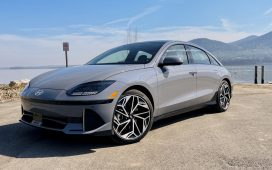At a recent House of Representatives subcommittee hearing on self-driving cars, Rep. Kat Cammack (R-FL) kicked off her five minutes of questions for the panelists with a quick appraisal of the toaster-shaped autonomous shuttle that has puttered around her district in Gainesville, Florida, for the past three years.
“It moves not very fast,” Cammack said with a grimace. “So there’s a lot of frustrations with it, I’ll say that.”
That’s something that the Gainesville Autonomous Shuttle has in common with Congress: neither seems to be much in a hurry.
“So there’s a lot of frustrations with it, I’ll say that”
The hearing on Wednesday, entitled “Self-Driving Legislative Framework: Enhancing Safety, Improving Lives and Mobility, and Beating China,” was the first related to autonomous vehicles in over a year. The goal was to break the logjam that has stalled AV legislation in Congress for over six years over disagreements ranging from increasing the number of autonomous vehicles on the road to prohibiting states from setting their own performance standards for AVs.
But based on the questions asked by lawmakers during the two-and-a-half-hour hearing, it doesn’t seem as if a breakthrough is anywhere on the horizon.
Rep. Frank Pallone (D-NJ), the top Democrat on the Energy and Commerce Committee, said at the hearing that Congress “cannot simply dust off six-year-old legislation and ignore the substantial issues that have emerged in recent years… Liability loopholes are emerging. Workforce impacts are becoming more apparent.”
A lot has happened since the first AV-related bill was introduced in Congress six years ago. The self-driving car industry has shrunk considerably, as funding has dried up and rosy predictions about the number of AVs that would appear on the road have failed to come to pass. Smaller startups were gobbled up by larger firms. Most AV operators have laid off employees; one shut down completely.
Congress “cannot simply dust off six-year-old legislation and ignore the substantial issues”
Two of the leading companies — Alphabet’s Waymo and GM’s Cruise — have been testing their fully driverless robotaxis in San Francisco, to decidedly mixed results. The companies note that they have driven hundreds of thousands of miles without any major crashes or injuries. But city officials have raised a host of complaints, including blocked buses and emergency vehicles, and local residents have protested the unfettered expansion of driverless cars in the city.
And yet autonomous vehicles were still heralded among lawmakers and panelists at Wednesday’s hearing as a potentially life-saving technology — one requiring swift action by Congress before the US finds itself lagging behind China in the race to perfect the technology.
“I think in this room we share a concern that China’s a major strategic threat,” said Gary Shapiro, president and CEO of the Consumer Technology Association. “I think we should beat them in the marketplace. And the way we beat them in the marketplace is we get this legislation passed.”
“I think we should beat them in the marketplace”
John Bozzella, president and CEO of the Alliance for Automotive Innovation, which represents the major automakers, agreed that Congress should act quickly to establish a regulatory framework, in part to beat China but also to staunch the bleeding in the industry.
“We are going to lose more companies and our innovative edge to other countries if we don’t do this now,” Bozzella said.
But the old sticking points remain. Rep. Kelly Armstrong (R-ND) raised the issue of legal liability and insurance in the event that a driverless car is involved in an accident. “In order to have a commercially viable automobile, you have to have insurance on it,” Armstrong said. “If I can’t walk into any car dealership anywhere in the country and buy a car that I can get insured, then we run the real risk of the technology far outpacing the policy.”
Shapiro argued that self-driving cars are less accident-prone and, therefore, have the potential to be less expensive to insure. But Armstrong said that Congress will still need to weigh in on the question of civil liability in cases involving autonomous vehicles with its regulatory framework.
“I agree on the abstract: it’s going to be safer, but each one of these individual cases is still going to be subject to a plaintiff lawyer, an insurance company, and a defense lawyer,” he said. “And until we figure that out, unfortunately, this is just a science project.”












